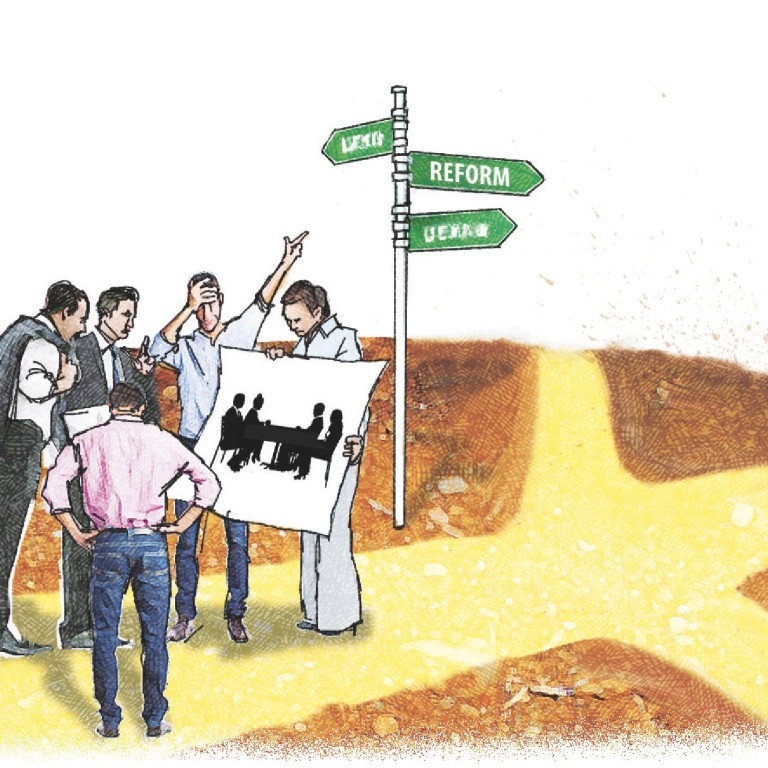
Hong Kong's pan-democrats must return to the middle ground
Tik Chi Yuen believes concessions on the political reform package are possible - but only if the pan-democrats show more willingness to go back to the negotiating table
After some two years of political disputes, the Hong Kong government has finally put forward its proposal for reform of the chief executive election in 2017, devised within the framework laid down by the National People's Congress Standing Committee. However, the package is vigorously opposed by the pan-democrats, due to restrictions on the nomination of candidates.
No sooner had the initial phase of political reform discussions begun when the pan-democrats began a series of combative civil disobedience strategies. First, they threatened to launch the Occupy Central campaign, which triggered alarm and disapproval within the central government.
Then, they launched an electronic referendum on universal suffrage, which probably provoked Beijing to issue its white paper on the practice of the "one country, two systems" policy in Hong Kong, and to lay out the political reform framework on August 31. The Umbrella Movement kicked off after that.
Such extreme actions have only made the central government more determined to take a hard line. Thus, the reform package is more conservative than had been expected.
Such an outcome clearly demonstrates the failure of pan-democratic strategies.
Mainstream pan-democrats originally had two plans, to use both resistance and negotiation. However, owing to pressure from extremists, combat has become their only strategy. That means that those who support the milder way - negotiation - are being suppressed.
In terms of how to achieve universal suffrage, the pan-democrats as a group have never put forward a concrete proposal for public discussion, with information about their general principles and claims about international standards. This reticence is a puzzle; people don't know what the pan-democrats really want. They have suggested civil nomination, but that idea violates the rules of the game and merely hardened the stance of the central government.
Hong Kong citizens hope that both the central government and pan-democrats can break the deadlock. The August 31 decision is not ideal, but it still has the approval of roughly half of citizens in surveys. Another poll shows that between 30 per cent and 50 per cent of pan-democrat supporters could support the package if the central government were to offer concessions, such as a promise to improve the package after 2017 and abolishing corporate voting by the Election Committee.
If the pan-democrats ignore the views of so many of their supporters and persist in their combative strategy, they will not only fail to achieve anything, but they will also fail the people of Hong Kong. When those seeking democracy ignore public opinion, it is frustrating.
Both the central government and the pan-democrats should be guided by public opinion on what to do next. If improvements are made, many pan-democratic supporters would support the package.
No one believes that the central government will retreat from its August 31 decision; that fantasy has gone. Nor does anyone expect Beijing to give up the basic principle of sovereignty. Where we can move forward is by seizing the opportunity to expand the democratic elements within the framework, a realistic alternative implied by the officials of both the central and Hong Kong governments.
I have detected from the different sides that it is possible to make improvements after the 2017 election as well as enhance the democracy in the nomination of the chief executive candidates. Those suggestions would not exceed what is permitted by the August 31 decision and are likely to win an all-round thumbs-up.
But why has the central government not yet made such concessions? It has been attributed to the uncertainty over whether, even with such concessions, pan-democratic lawmakers would approve the reform package.
To free us from the current political stalemate, it's vital that more leaders of the pan-democratic camp adopt a new mindset and find the courage to return to the negotiating table.
Pan-democrats are currently moving to the extreme, exaggerating their political stance and being too stubborn. I have learned that many pan-democrat leaders acknowledge in their hearts that it is better to approve the reform package than to veto it, but they fear the extremists and therefore maintain their opposing stance.
If there are no compromises, only conflict, it is definitely not a blessing to the public. Let us return to rational discussion, let the central government make a goodwill gesture and let the pan-democrats come back to negotiations. Through negotiation, we could initiate a breakthrough to get us out of our political dilemma.

